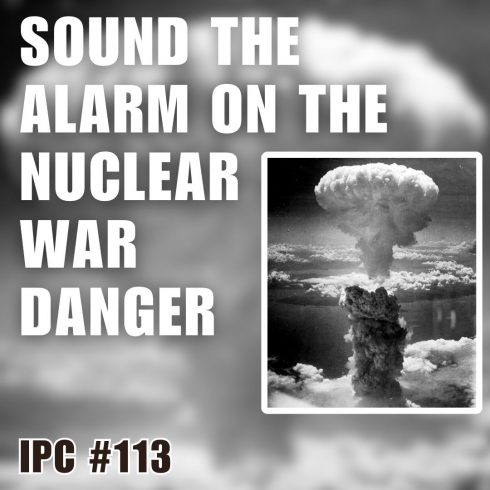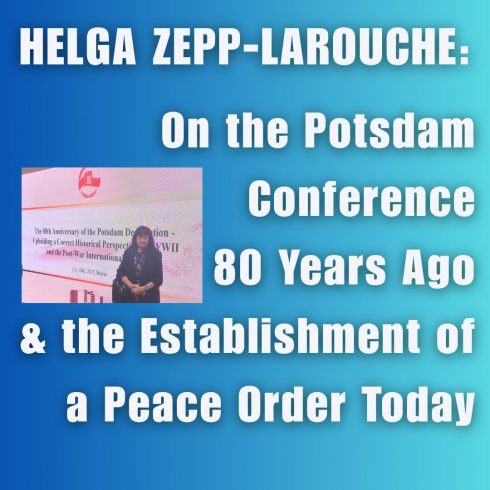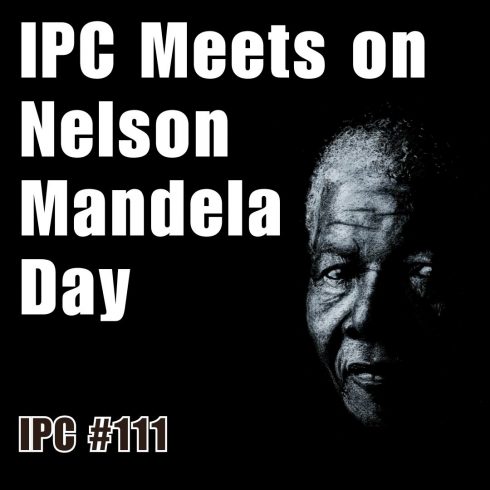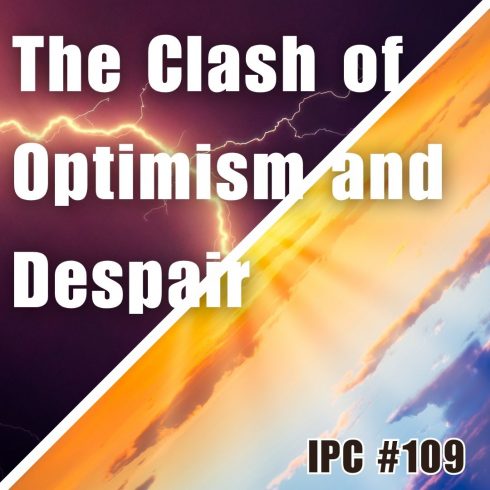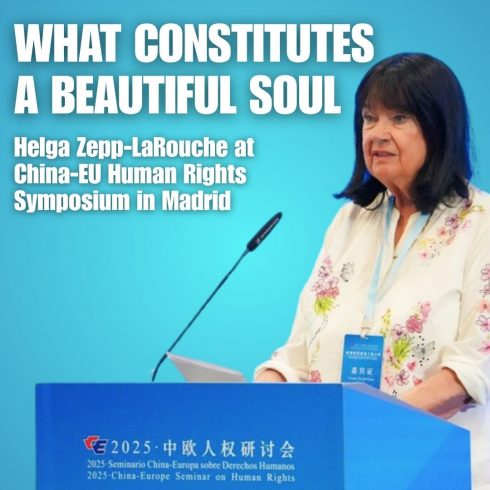The 113th consecutive online meeting of the International Peace Coalition was opened by its initiator and founder of the Schiller Institute, Helga Zepp-LaRouche, who warned that we may be approaching the “final storm” of the strategic situation. As the meeting took place, news came out that President Trump had, as he wrote on Truth Social, “ordered two Nuclear Submarines to be positioned in the appropriate regions,” in the spirit of confrontation with Russia. Zepp-LaRouche, warning of this escalation, called on everyone to “alarm the whole world that we need to unify the peace movement,” and make an “extraordinary intervention in the strategic situation” to change its dangerous course.
Zepp-LaRouche in her briefing included other updates she termed “fast moving and wild.” On the genocide in Gaza, even though the media is now reporting on it, the world community has been impotent to stop it. A 24-page report delivered by UN Special Rapporteur Francesca Albanese names the corporations that are profiting from the slaughter in Gaza, which deserves international scrutiny. In a grotesque response, Secretary of State Marco Rubio placed sanctions on Albanese. She went on to say that the Gaza Humanitarian Foundation is a “death trap,” luring desperate Palestinians to their deaths with the promise of food. No lasting solution is possible without the New International Security and Development Architecture.
Turning to economic issues, Zepp-LaRouche asserted that “President Trump has obviously created havoc” in the international economic and financial system. Trump’s trade deal will hurt Europe, but it’s already falling apart. Trump’s claims about the content of the deal are being disputed; supposedly Europe will spend $750 billion over three years to buy LNG, but it is “hanging in the air” because energy purchases are the province of individual firms and governments, not the EU.
The hope that Trump could normalize relations with Russia is very much in question. Russian Foreign Minister Lavrov has authored an article saying that Europe is becoming the Fourth Reich because of their “unrestrained militarization.” Is Trump backing General Christopher Donahue’s proposal to seize Russia’s Kaliningrad oblast?
The second speaker was Mossi Raz, former Knesset Member, former Director of-General of Peace Now, and former Israeli paratrooper, who said that the conflict in Gaza cannot be ended by force. He acknowledged the significance of Macron and others calling for a Palestinian state, and called attention to Indonesian President Prabowo Subianto’s statement that Indonesia is willing to recognize and establish diplomatic relations with Israel if Israel itself recognizes an independent Palestinian state. Raz supports the Egyptian peace plan, which can work under such circumstances.
Ray McGovern, former CIA analyst, co-founder of Veteran Intelligence Professionals for Sanity (VIPS) and frequent IPC panelist, congratulated the first two speakers, saying, “The emphasis is exactly where it should be, that my country is enabling genocide.” He quoted South African Bishop Desmond Tutu who said, after visiting Israel, that apartheid was worse there than in South Africa. He followed this with a quote from Rabbi Abraham Joshua Heschel, who said that when genocide happens, not all of us are guilty, but all of us are responsible. Trump is supporting Israel because he fears being blackmailed with Epstein material. McGovern described this as “heinousness squared.” He reminded participants that the Deep State, including intelligence agencies, media, and the Democratic Party, tried to “emasculate” Trump after 2016 victory to prevent normalization with Russia. “My specialty is intentions,” said McGovern, and “if Trump had any flexibility at all, he would do a deal on Ukraine.” He asked participants to look at his latest piece on Consortium News.
Veteran Brazilian journalist Luiz Erthal was pleasantly surprised by the outcome of the recent BRICS summit, which he covered along with EIR’s Tim Rush. Previously, Brazil was bending to the Biden administration. But now the Brazilian government maintained a firm position. The energetic condemnation of the genocide in Gaza was important. Lula has defended the country’s sovereignty and united the Brazilian people.
Brazil has become a priority target for Trump, because its constitution gives the government control over everything in the subsoil, including strategically important rare earths. Support for indicted former President Bolsonaro is seen as a way to circumvent this.
Erthal concluded by saying, “we hope for the day when the United States joins the BRICS.”
Reports on Activism
Diane Sare, President of The LaRouche Organization President reported on their activity around the conference at the UN July 28-29 for the two-state solution. UN security guards actually tried to confiscate their leaflets from delegates who were entering the building, but there was very little resistance to anti-genocide polemics and calling for similar measures to those that ended apartheid in South Africa.
Activist Rafed Aljoboury reported on his disaster relief organization, the Integrity Political Action Committee, and its activity in Gaza. They are getting emergency requests for baby formula, which is only available on the black market. A week’s supply for one baby costs $60-70. Israeli forces are in cahoots with bandits that steal the food and sell it.
His group plans big rallies on September 15. He called attention to Anthony Aguilar, a former Green Beret who has accused the Israeli Defense Forces (IDF) of committing war crimes at aid distribution sites, and endorsed the Universal Disaster Relief Foundation.
Moderator Anastasia Battle offered a report on the recent World Peace Conference in China, which she attended along with 3,000 youth. The conference focused on the importance of the Global South and peace through economic development. She was particularly moved by the cultural panel, which featured presentations from around the world. The delegation from Japan sang “Sakura,” a traditional Japanese folk song that depicts the beauty and transience of cherry blossoms, which was seen as a gesture of reconciliation after World War II, and many Chinese participants were crying.
There were also activism reports from France and Nicaragua.
Zepp-LaRouche said we must redouble our efforts to unify the international peace movement, and thanked Erthal for his call for the U.S. to join BRICS.
Erthal said that BRICS needs a permanent headquarters in the Western Hemisphere so that no one can say that BRICS opposes the West. Rio de Janeiro has been proposed as a site.
Discussion: Is the IPC a ‘Big Tent’?
During the discussion period, there were objections to Israelis who claim they want peace, but deny the right of Palestinians to self-defense or oppose the release of Palestinian hostages held in Israeli prisons.
In response, Zepp-LaRouche said international law has already broken down after the U.S. prepared an attack on Iran while pretending to negotiate. She emphasized the gravity of the present situation: “We have a situation where Civilization is almost gone—I think the clock is ticking.” Politicians are gambling with nuclear war—if we can’t stop that, “You can forget all the other issues.” This demands the method of the coincidence of opposites—a solution must be found on a higher level than the level on which the dispute arose. This is why we don’t exclude people with whom we have disagreements on that lower level.
Co-moderator Dennis Small added that if we begin by excluding from the discussion people who are not on our line, we will be talking to ourselves. He said that on the “higher level,” the central issue of the collapse of the global financial system. Trump’s tariff policy is the flip side of the promotion of crypto-currency. Debtor nations who cannot export will default. They will be forced to choose between IMF genocide, or moving to a new trading system. There will be a massive explosion of inflation in the U.S. because Trump’s crypto-currency policy will unleash an unprecedented bubble of speculation. The money from the tariffs will not go to productive investment, but get sucked into the bubble. This is the real source of the problem which is causing the genocide.
Diane Sare emphasized that Russiagate was not just about the election. It was a British operation to orchestrate a war with Russia.
Zepp-LaRouche concluded that time is running out, and more is needed than our weekly discussion. Anyone who has access to international organizations must bring them into direct collaboration. [eir]
















